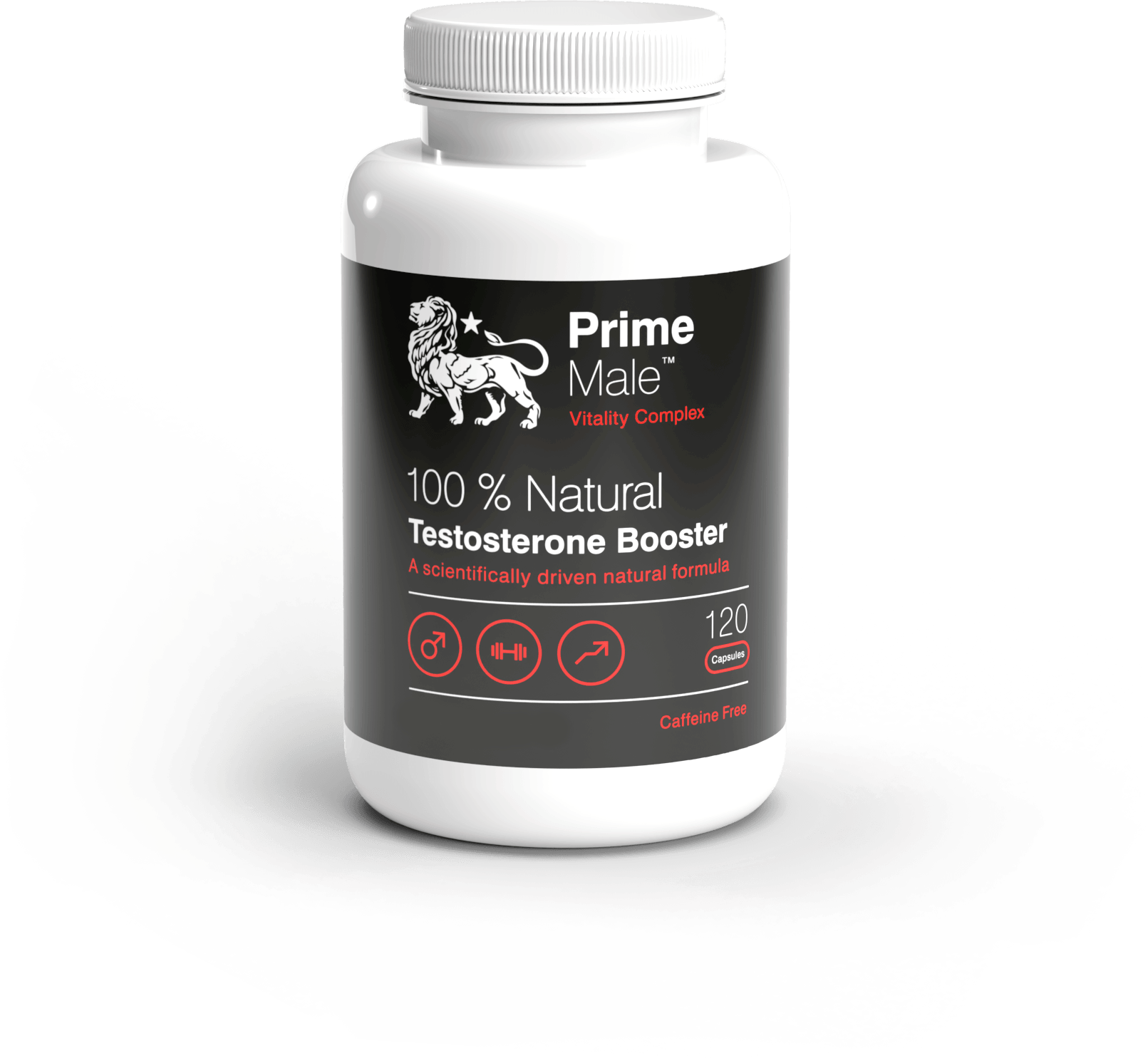We ship worldwide from the USA and UK
PRIME MALE BLOG : GET BACK TO YOUR PRIME
We ship worldwide from the USA and UK
PRIME MALE BLOG : GET BACK TO YOUR PRIME
Testosterone levels in men are dropping at an alarming rate. According to recent research, the average testosterone level for men of all ages has declined by 1 to 1.8% every year over the past three decades [1]. That adds up to a staggering 30 to 54% decline in just 30 years. While it may seem like this drop only affects men as they get older, the reality is far more concerning. The subtle signs of low testosterone can show up in men of all ages, often going unnoticed until they significantly impact your health and quality of life. Recognizing these early signs is key to taking control of your well-being before it’s too late.
Table of Contents
In this article, we’ll uncover four often-missed signs of low testosterone and share proven strategies to boost your levels naturally.
If you’re in your 20s or 30s, you might assume this issue doesn’t apply to you. However, the likelihood that you have lower-than-optimal testosterone levels might be higher than you think. A 2007 research paper indicated a substantial population-level decrease in testosterone among American men, independent of age [2]. More recent studies from 2020 reported a 20% prevalence of testosterone deficiency among adolescent and young adult males, showing that levels have been declining even in this group [3].
While testosterone levels can vary greatly between men and naturally decline as we age, it’s not surprising that many men as early as their 20s and 30s face declining testosterone levels, with symptoms impacting their vitality, mood, and overall health.
So, how do you know if your levels are low? Let’s explore the often-overlooked signs of low testosterone. The first one might surprise you!

When most people think of testosterone, they often associate it with physical attributes like muscle mass and strength. However, testosterone also plays a significant role in regulating mood and emotional well-being. The hormone exerts its effects on the brain, particularly in regions involved in mood regulation, such as the amygdala and hippocampus.
Testosterone influences the production and activity of neurotransmitters such as serotonin, dopamine, and norepinephrine, which are critical for maintaining mood balance. Low testosterone levels can disrupt this balance, leading to symptoms of depression, irritability, and anxiety. On the flip side, increasing testosterone when levels are low can have a profound positive impact on your mood, leading to increased happiness, reduced anxiety, and an overall sense of well-being.
Several studies have demonstrated the connection between testosterone levels and mood. For instance, research published in the Journal of Clinical Endocrinology & Metabolism found that men with low testosterone levels were more likely to suffer from depression, particularly in older age groups. However, this correlation isn’t limited to older men. Even younger men can experience mood disturbances when their testosterone levels dip below optimal levels[4].
One of the key benefits of naturally boosting testosterone is the associated improvement in mood. Calm, relaxed individuals typically have higher testosterone levels. This is because adequate testosterone helps to regulate the stress hormone cortisol, keeping it in check and preventing it from reaching levels that can lead to anxiety and stress. By increasing your testosterone naturally, you can help your body maintain a more balanced and positive mood, reducing the likelihood of mood swings and irritability[5].
Rather than resorting to synthetic testosterone replacement therapy (TRT), which can come with a host of side effects, many men find success with natural testosterone boosters. These supplements, when combined with lifestyle changes, can safely elevate testosterone levels and enhance mood. Ingredients such as fenugreek, ashwagandha, and zinc are well-researched for their ability to support healthy testosterone levels and improve mood. For example, ashwagandha has been shown to significantly reduce stress and anxiety, which in turn helps to increase testosterone levels[6].
Regular exercise, particularly resistance training and high-intensity interval training (HIIT), also plays a crucial role in boosting testosterone. These forms of exercise not only increase testosterone but also improve mood by enhancing the production of endorphins, the body’s natural “feel-good” hormones. When combined with natural testosterone-boosting supplements, the effects on mood and well-being can be quite profound[7].
Diet is another crucial factor. Consuming foods rich in healthy fats, proteins, and essential vitamins like Vitamin D and Zinc can support testosterone production and contribute to a stable, positive mood. For instance, foods like fatty fish, eggs, and nuts are excellent for maintaining healthy testosterone levels and supporting mental well-being[8].
Overall, boosting low testosterone levels naturally can significantly enhance your mood and overall happiness. By focusing on natural methods—such as supplements, exercise, and diet—you can achieve a calm, relaxed state, which is often associated with higher testosterone levels. This approach not only helps in improving your physical health but also supports a positive and resilient mental state, leading to a better quality of life.

Sleep plays a crucial role in maintaining overall health, and signs of low testosterone are closely linked to sleep quality. Testosterone not only influences how well you sleep, but your sleep patterns also impact how much testosterone your body produces. When testosterone levels drop, it can lead to poor sleep quality, and poor sleep, in turn, can further reduce testosterone levels, creating a vicious cycle.
Testosterone levels naturally rise during sleep, particularly during the REM (Rapid Eye Movement) phase, which is the deepest and most restorative part of the sleep cycle. This is why men with healthy testosterone levels often wake up feeling refreshed and energized. However, when testosterone levels are low, the amount of cortisol—the body’s primary stress hormone—increases. Elevated cortisol levels can disrupt sleep by making it harder to fall asleep, stay asleep, and achieve deep, restorative sleep stages[9].
Interrupted or poor-quality sleep can manifest in various ways, such as difficulty falling asleep, frequent awakenings during the night, and waking up feeling tired rather than refreshed. Over time, these sleep disturbances can lead to a chronic state of fatigue and low energy, further exacerbating the problem of low testosterone[10].
Improving testosterone levels naturally can significantly enhance sleep quality. One of the most effective ways to achieve this is through lifestyle changes that promote both better sleep and higher testosterone production. For example, maintaining a consistent sleep schedule, avoiding screens before bed, and creating a relaxing bedtime routine can all help improve sleep quality. These practices support your body’s natural circadian rhythm, which is crucial for both sleep and hormone production[11].
Additionally, natural testosterone-boosting supplements can play a key role in breaking the cycle of poor sleep and low testosterone. Ingredients such as magnesium, zinc, and ashwagandha are known to support healthy testosterone levels and improve sleep quality. Magnesium, for instance, helps regulate neurotransmitters that promote sleep, while zinc is involved in the production of melatonin, the hormone that governs sleep cycles. Ashwagandha, with its stress-reducing properties, can help lower cortisol levels, thereby improving sleep and indirectly boosting testosterone production[12].

Tested and Trusted
By Over 1 Million Men
Another important factor to consider is managing stress levels. Chronic stress is a major contributor to sleep disturbances and can lead to consistently high cortisol levels, which suppress testosterone production. Practices such as mindfulness, meditation, and deep breathing exercises can help reduce stress and improve sleep, thereby supporting healthier testosterone levels[13].

Have you noticed a loss in lean muscle mass or an increase in body fat? These could be signs of low testosterone. Testosterone is a key hormone that plays a crucial role in maintaining body composition, particularly in building and preserving lean muscle mass and regulating fat distribution. When testosterone levels are optimal, your body is better equipped to maintain a healthy balance between muscle and fat. However, when testosterone levels drop, noticeable changes in body composition can occur, often manifesting as a decrease in muscle mass and an increase in body fat.
Testosterone influences how your body processes and utilizes nutrients, including proteins, fats, and carbohydrates. It promotes protein synthesis, which is essential for muscle growth and repair. When testosterone levels decline, your body’s ability to build and maintain muscle mass diminishes. This often results in a reduction in lean muscle, which not only affects physical strength but also lowers your metabolism, making it easier to gain fat[14].
Low testosterone is also linked to an increase in fat deposits, particularly in the abdominal area. This is because testosterone helps regulate fat metabolism, and when levels are low, the body tends to store more fat, especially visceral fat, which is the fat that surrounds internal organs. This type of fat is particularly concerning because it is associated with a higher risk of metabolic disorders, including insulin resistance, type 2 diabetes, and cardiovascular diseases[15].
Another factor contributing to these body composition changes is the hormone cortisol. Elevated cortisol levels, which often accompany low testosterone, can lead to increased fat storage and muscle breakdown. Cortisol is a catabolic hormone, meaning it breaks down tissue, and when it’s elevated, it can counteract the anabolic (muscle-building) effects of testosterone. This imbalance can lead to further muscle loss and fat gain, creating a cycle that is difficult to break[16].
Check out our article on Testosterone killers to learn more
Improving testosterone levels naturally can help reverse these negative body composition changes. Regular resistance training is one of the most effective strategies for boosting testosterone and preserving muscle mass. Exercises like weight lifting stimulate testosterone production and promote muscle growth, helping to restore a healthier balance between muscle and fat[17].
In addition to exercise, natural testosterone-boosting supplements can support muscle maintenance and fat loss. Ingredients such as fenugreek, D-aspartic acid, and Vitamin D have been shown to enhance testosterone levels and improve body composition. Fenugreek, for example, has been found to increase strength and reduce body fat in men who engage in resistance training[18].
Diet also plays a critical role in maintaining healthy testosterone levels and body composition. Consuming a diet rich in lean proteins, healthy fats, and complex carbohydrates provides the necessary nutrients for testosterone production and muscle maintenance. Ensuring adequate intake of essential vitamins and minerals, such as zinc and magnesium, is also important, as deficiencies in these nutrients can impair testosterone production and exacerbate body composition issues[19].

Have you noticed a decrease in your sex drive or a lack of interest in sexual activity? Low testosterone could be the cause and one of the key signs of low testosterone. Testosterone is a key hormone that plays a crucial role in maintaining sexual health and libido. When testosterone levels are optimal, you’re more likely to experience a healthy sex drive and overall sexual satisfaction. However, when testosterone levels drop, it can lead to a noticeable decrease in libido and other sexual dysfunctions.
Testosterone is directly linked to the brain’s regulation of sexual desire and activity. It stimulates receptors in the brain to produce nitric oxide, a molecule that plays a key role in triggering the chemical reactions necessary for an erection. When testosterone levels are low, this process can be impaired, leading to reduced sexual desire and performance issues[20].
A decrease in libido can also be accompanied by other symptoms of low testosterone, such as fatigue, depression, and irritability, all of which can further diminish interest in sexual activity. The psychological impact of low testosterone, such as decreased self-confidence and mood changes, can also play a significant role in reducing libido. This creates a feedback loop where low testosterone leads to low libido, which in turn can cause stress and anxiety, further exacerbating the problem[21].
Improving testosterone levels naturally can help restore libido and enhance sexual health. One effective strategy is the use of natural testosterone-boosting supplements. Ingredients like fenugreek, Tribulus terrestris, and D-aspartic acid have been shown to support healthy testosterone levels and improve sexual function. For instance, fenugreek has been found to increase sexual arousal and satisfaction in men by naturally boosting testosterone levels[22].
In addition to supplements, lifestyle changes such as regular exercise, stress management, and a balanced diet rich in essential nutrients can significantly impact testosterone levels and sexual health. Exercise, particularly resistance training and high-intensity interval training (HIIT), has been shown to naturally increase testosterone levels, which can help improve libido and sexual performance[23].
Check out this article on Resolutions for Men Over 40 to learn more
Diet also plays an essential role in maintaining healthy testosterone levels. Foods rich in zinc, Vitamin D, and healthy fats are crucial for testosterone production and can positively affect sexual health. Zinc, in particular, is known for its role in hormone production, and deficiencies in this mineral can lead to lower testosterone levels and reduced libido[24].
Addressing stress is another important factor, as chronic stress leads to elevated cortisol levels, which can suppress testosterone production and reduce sexual desire. Stress management techniques such as mindfulness, meditation, and relaxation exercises can help lower cortisol levels and support healthier testosterone levels, thereby improving libido[25].
If you’ve recognized any of the signs of low testosterone discussed above, you might be wondering what steps you can take to improve your levels naturally. Fortunately, there are several effective strategies you can implement to help restore your testosterone levels, enhance your overall health, and improve your quality of life.
Ensuring that you get enough high-quality sleep each night is essential for maintaining healthy testosterone levels. Aim for 7-9 hours of sleep per night, and try to maintain a consistent sleep schedule by going to bed and waking up at the same time each day. Creating a relaxing bedtime routine, avoiding screens before bed, and sleeping in a dark, quiet room can help improve your sleep quality and support your body’s natural testosterone production[1].
Engaging in regular physical activity, particularly resistance training and high-intensity interval training (HIIT), is one of the most effective ways to boost testosterone naturally. Weightlifting and other forms of strength training stimulate testosterone production and help build and maintain muscle mass, which is critical for overall health and metabolism[2]. Aim to include resistance training sessions 2-3 times per week as part of your exercise routine.
Chronic stress is a major contributor to low testosterone levels. High stress leads to elevated cortisol levels, which can suppress testosterone production. Incorporating stress management techniques into your daily routine—such as mindfulness, meditation, deep breathing exercises, or yoga—can help lower cortisol levels and support healthier testosterone levels[3].
Learn more about how Ashwagandha can help manage stress here
Your diet plays a crucial role in maintaining healthy testosterone levels. Focus on consuming a balanced diet that includes plenty of lean proteins, healthy fats, and complex carbohydrates. Foods rich in essential vitamins and minerals, such as zinc, Vitamin D, and magnesium, are particularly important for supporting testosterone production[4]. Consider incorporating foods like fatty fish, eggs, nuts, seeds, and leafy greens into your meals to ensure you’re getting the necessary nutrients.
If lifestyle changes alone aren’t enough to bring your testosterone levels back to optimal levels, natural testosterone-boosting supplements can be a helpful addition. One highly recommended option is Prime Male Vitality Test Booster, a premium supplement that contains powerful ingredients like fenugreek, ashwagandha, D-aspartic acid, and zinc. These ingredients are proven to support healthy testosterone levels and alleviate common symptoms of low testosterone, such as reduced libido, fatigue, and muscle loss[5]. Prime Male is formulated to naturally boost testosterone and improve overall vitality. Be sure to choose high-quality supplements from reputable sources like Prime Male to ensure their effectiveness and safety.

The Only Testosterone Booster for Men Over 40 with a Clinically Proven Formula to Restore Muscle Strength, Energy and Libido.
Order NowAs you implement these strategies, it’s important to monitor your progress and make adjustments as needed. Pay attention to how your body responds to these changes, and consider getting your testosterone levels tested regularly to track improvements. If your symptoms persist despite making these lifestyle changes, it may be worth consulting a healthcare professional for further evaluation and guidance.
[1] – “A Population-Level Decline in Serum Testosterone Levels in American Men.” Journal of Clinical Endocrinology & Metabolism. Available at: https://academic.oup.com/jcem/article/92/1/196/2597482
[2] – Travison TG, Araujo AB, O’Donnell AB, et al. “A Population-Level Decline in Serum Testosterone Levels in American Men.” Journal of Clinical Endocrinology & Metabolism. 2007; Available at: https://www.ncbi.nlm.nih.gov/pmc/articles/PMC3125089/
[3] – Wang, C. et al. “Prevalence and Determinants of Low Testosterone in Men: Results from the Boston Area Community Health Survey.” American Journal of Men’s Health. 2020; Available at: https://journals.sagepub.com/doi/10.1177/1557988320949322
[4] – Barrett-Connor, E., & Von Mühlen, D. “Low Testosterone Levels Are Associated with Depressive Symptoms in Older Men: The Rancho Bernardo Study.” Journal of Clinical Endocrinology & Metabolism. 1999; Available at: https://academic.oup.com/jcem/article/84/3/754/2864885
[5] – Rubinow, D. R., & Schmidt, P. J. “Androgens, Brain, and Behavior.” American Journal of Psychiatry. 1996; Available at: https://ajp.psychiatryonline.org/doi/full/10.1176/ajp.153.8.974
[6] – Wankhede, S., et al. “Examining the Effect of Withania somnifera Supplementation on Muscle Strength and Recovery: A Randomized Controlled Trial.” Journal of the International Society of Sports Nutrition. 2015; Available at: https://jissn.biomedcentral.com/articles/10.1186/s12970-015-0104-9
[7] – Hayes, L. D., et al. “Testosterone, Aging, and Exercise: A Mini-Review.” Frontiers in Physiology. 2020; Available at: https://www.frontiersin.org/articles/10.3389/fphys.2020.00369/full
[8] – Maggio, M., & De Vita, F. “Testosterone and Depression in Aging Men.” Nature Reviews Endocrinology. 2011; Available at: https://www.nature.com/articles/nrendo.2011.125
[9] Vgontzas, A. N., et al. “Sleep Apnea and Sleep Disruption: Clinical and Therapeutic Implications.” Current Opinion in Pulmonary Medicine. 2017; Available at: https://journals.lww.com/co-pulmonarymedicine/Abstract/2017/11000/Sleep_apnea_and_sleep_disruption__Clinical_and.9.aspx
[10] Leproult, R., & Van Cauter, E. “Effect of 1 Week of Sleep Restriction on Testosterone Levels in Young Healthy Men.” JAMA. 2011; Available at: https://jamanetwork.com/journals/jama/fullarticle/646969
[11] Walker, M. P. “The Role of Sleep in Cognition and Emotion.” Annals of the New York Academy of Sciences. 2009; Available at: https://nyaspubs.onlinelibrary.wiley.com/doi/full/10.1111/j.1749-6632.2009.04416.x
[12] Wankhede, S., et al. “Examining the Effect of Withania somnifera Supplementation on Muscle Strength and Recovery: A Randomized Controlled Trial.” Journal of the International Society of Sports Nutrition. 2015; Available at: https://jissn.biomedcentral.com/articles/10.1186/s12970-015-0104-9
[13] Michels, N., et al. “Psychosocial Stress, Cortisol, and Sleep: A Systematic Review.” Sleep Medicine Reviews. 2013; Available at: https://www.sciencedirect.com/science/article/abs/pii/S1087079212000615
[14] Bhasin, S., et al. “Testosterone Therapy in Men with Hypogonadism: An Endocrine Society Clinical Practice Guideline.” Journal of Clinical Endocrinology & Metabolism. 2018; Available at: https://academic.oup.com/jcem/article/103/5/1715/4939455
[15] Kaplan, S. A., et al. “Testosterone Therapy in Men with Metabolic Syndrome and Diabetes: Reducing Risks and Improving Outcomes.” Journal of Sexual Medicine. 2013; Available at: https://www.jsm.jsexmed.org/article/S1743-6095(15)30847-2/fulltext
[16] Tsilidis, K. K., et al. “Metabolic Syndrome and Low Testosterone in Men: A Review.” Journal of Clinical Endocrinology & Metabolism. 2010; Available at: https://academic.oup.com/jcem/article/95/6/2537/2596318
[17] Kraemer, W. J., et al. “Hormonal Responses and Adaptations to Resistance Exercise and Training.” Sports Medicine. 2005; Available at: https://link.springer.com/article/10.2165/00007256-200535010-00004
[18] Poole, C., et al. “The Effect of Fenugreek Extract Supplementation on Strength and Body Composition: A Randomized, Double-Blind, Placebo-Controlled Study.” Journal of the International Society of Sports Nutrition. 2010; Available at: https://jissn.biomedcentral.com/articles/10.1186/1550-2783-7-34
[19] Zmuda, J. M., et al. “Testosterone, Body Composition, and Strength in Young Men.” Journal of Clinical Endocrinology & Metabolism. 1996; Available at: https://academic.oup.com/jcem/article/81/10/3749/2874470
[20] Corona, G., et al. “The Role of Testosterone in Erectile Function and Dysfunction.” Nature Reviews Urology. 2012; Available at: https://www.nature.com/articles/nrurol.2012.197
[21] Araujo, A. B., et al. “The Relationship Between Testosterone and Libido: What We Know and What We Don’t Know.” Mayo Clinic Proceedings. 2008; Available at: https://www.mayoclinicproceedings.org/article/S0025-6196(11)61191-2/fulltext
[22] Rao, A., et al. “An Overview of the Non-androgenic Actions of Testosterone on the Male Reproductive System.” Asian Journal of Andrology. 2014; Available at: https://www.ajandrology.com/article.asp?issn=1008-682X;year=2014;volume=16;issue=2;spage=192;epage=196;aulast=Rao
[23] Hayes, L. D., et al. “Testosterone, Aging, and Exercise: A Mini-Review.” Frontiers in Physiology. 2020; Available at: https://www.frontiersin.org/articles/10.3389/fphys.2020.00369/full
[24] Prasad, A. S. “Zinc in Human Health: Effect of Zinc on Immune Cells.” Molecular Medicine. 2008; Available at: https://molmed.biomedcentral.com/articles/10.2119/2008-00033.Prasad
[25] Michels, N., et al. “Psychosocial Stress, Cortisol, and Sleep: A Systematic Review.” Sleep Medicine Reviews. 2013; Available at: https://www.sciencedirect.com/science/article/abs/pii/S1087079212000615